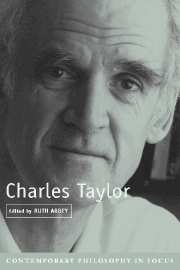Book contents
- Frontmatter
- Contents
- List of Contributors
- Acknowledgments
- Introduction: Timely Meditations in an Untimely Mode - The Thought of Charles Taylor
- 1 Taylor and the Hermeneutic Tradition
- 2 Taylor's (Anti-) Epistemology
- 3 The Self and the Good: Charles Taylor's Moral Ontology
- 4 Articulating the Horizons of Liberalism: Taylor's Political Philosophy
- 5 Toleration, Proselytizing, and the Politics of Recognition: The Self Contested
- 6 Taylor and Feminism: From Recognition of Identity to a Politics of the Good
- 7 Catholicism and Philosophy: A Nontheistic Appreciation
- 8 Taylor, “History”, and the History of Philosophy
- Bibliography
- Index
7 - Catholicism and Philosophy: A Nontheistic Appreciation
Published online by Cambridge University Press: 05 June 2012
- Frontmatter
- Contents
- List of Contributors
- Acknowledgments
- Introduction: Timely Meditations in an Untimely Mode - The Thought of Charles Taylor
- 1 Taylor and the Hermeneutic Tradition
- 2 Taylor's (Anti-) Epistemology
- 3 The Self and the Good: Charles Taylor's Moral Ontology
- 4 Articulating the Horizons of Liberalism: Taylor's Political Philosophy
- 5 Toleration, Proselytizing, and the Politics of Recognition: The Self Contested
- 6 Taylor and Feminism: From Recognition of Identity to a Politics of the Good
- 7 Catholicism and Philosophy: A Nontheistic Appreciation
- 8 Taylor, “History”, and the History of Philosophy
- Bibliography
- Index
Summary
“Occasionally, I laugh.”
Charles TaylorPHILOSOPHY AND FAITH
Charles Taylor is a thinker of singular importance. He breaks new ground in contemporary thought by refusing to align himself unreservedly with the large options presented to us. He is not easily definable as either a secularist or devotee of a lost Christendom, a defender of modernity or one who seeks to return to an enchanted world, an empiricist or a rationalist, a simple universalist or an obdurate relativist, a defender of philosophy against faith or of faith against philosophy, a tight lipped analytic philosopher or a loose tongued continental thinker. Each time a philosophical or theological faction seeks to etch a division in stone, Taylor surfaces to complicate the picture. He chastens the contending parties and proposes options that command the attention of reflective thinkers.
His work is admirable in another, related respect. Over the last four decades he has displayed a remarkable ability to move across the metaphysical, epistemological, anthropological, political, and ethical registers of thought, showing others through these explorations how each dimension of his work helps to define the others. Showing them, too, how a similar complex of loose implications and interdependencies operates within their own thinking. In this way, Taylor extends the horizon of contemporary thought. He encourages you to check one dimension of your thought against others, even as you test the larger complex against his multidimensional perspective.
- Type
- Chapter
- Information
- Charles Taylor , pp. 166 - 186Publisher: Cambridge University PressPrint publication year: 2004
- 13
- Cited by



